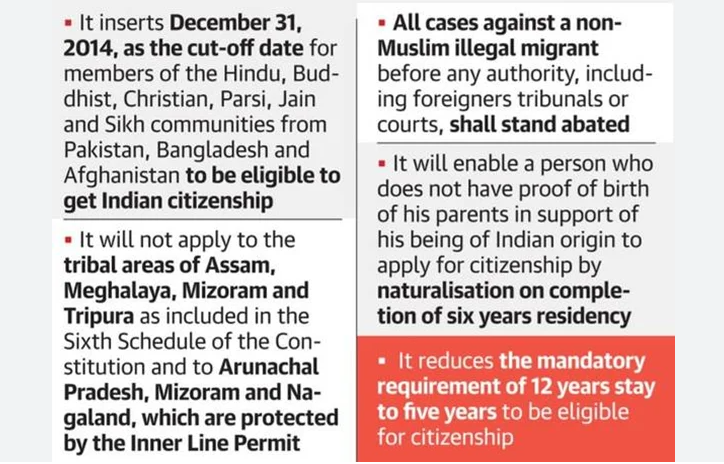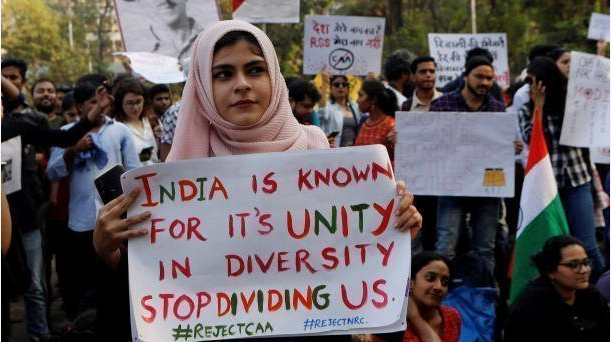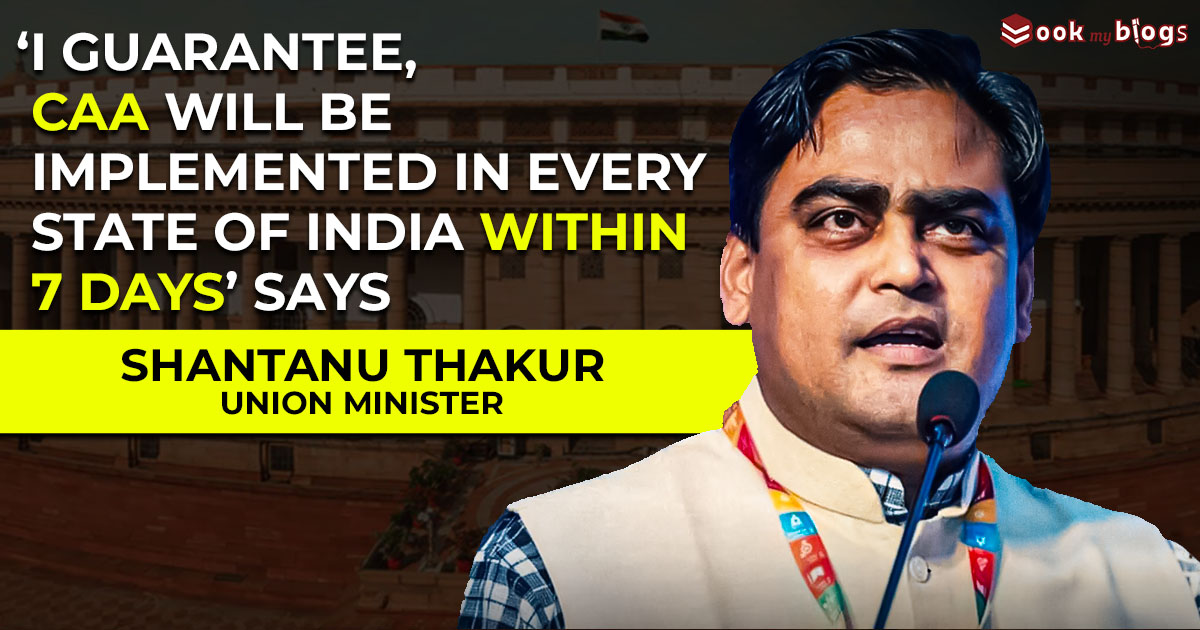Introduction
‘I guarantee CAA will be implemented in every state of India within 7 days,’ says union minister Shantanu Thakur. With this statement, a wave of controversy erupted.
Union Home Minister Amit Shah also stated during the ET Now-Global Business summit in Delhi that “CAA is an Act of the country, it will be definitely be notified…It will be notified before the polls…There should be no confusion around it”.
Some politicians, especially Mamta Banerjee, opposed this statement and labeled this announcement as an act to get votes. She claimed that she won’t let this happen till she is alive.
Earlier in 2019, the CAA enactment ignited many large-scale, destructive protests nationwide. The demonstrations in Shaheen Bagh and Assam were very violent, and the state must fear the recurrence of such demonstrations or any worse conditions.
What is the Citizenship Amendment Act of 2019?

The Citizenship (Amendment) Act, 2019, popularly known as the CAA, has been debated and discussed since its enactment. It was passed in December 2019 by the Indian Parliament. This act seeks to amend the Citizenship Act of 1955, introducing changes to the criteria for acquiring Indian citizenship.
The primary objective of the CAA, as stated by its supporters, is to provide a fast-track pathway to Indian citizenship for persecuted minorities facing religious discrimination in neighboring Muslim-majority countries. The act will give citizenship to “persecuted non-Muslims who immigrated to India from Bangladesh, Pakistan, and Afghanistan.”
This category includes Hindus, Sikhs, Buddhists, Jains, Parsis, and Christians from these countries who entered India before December 31, 2014, and are eligible for citizenship. The CAA amends the definition of an “illegal immigrant” by excluding specific groups from Afghanistan, Bangladesh, and Pakistan. The act reduces the mandatory residency period for naturalization from 11 years to 5 years for the specified religious communities.
Controversies Surrounding the CAA:

1. Exclusion of Muslims:
One of the main criticisms of this act is that if this act is for minorities, why does it exclude Muslims from its provisions? If this act is founded for the rights of immigrants who were discriminated against and persecuted based on religion. Why does it not include Rohingyas from Buddhist Myanmar and Tibetian Buddhists?
2. Impact on Secularism and Protests:
The country has already witnessed its reaction when it was enacted in 2019, and many deaths were recorded. After the construction of Ayodhya Ram Mandir, India has again seen many riots in various areas. If CAA is brought into force, India will witness many riots, destruction, and deaths again for sure! Critics argue that the CAA violates the secular principles written in the Indian Constitution by favoring certain religious groups over others. The government contends that the CAA is a humanitarian measure to relieve persecuted minorities, especially in neighboring countries.
3. Linkage with the National Register of Citizens (NRC):
Various people also fear that the CAA may be used in connection with the National Register of Citizens (NRC) to target and marginalize Muslim communities, which has fueled widespread protests.
Why Is It Not Implemented?
At this point, we all must be wondering: if it was passed in 2019, why is it yet to be implemented even after four years? And why this dead matter is being taken up again? The answer is complex yet very straight. CAA offers no such benefits to anyone, and it is just propaganda for votes from the Hindu majority. All these minorities already have the national ID “Adhaar Card” and are getting all the benefits offered by the government to its citizens.
CAA Is Now Notified
Better late than never, the government notified the Citizenship Amendment Act (CAA) on March 11, 2024. While it was passed in 2019, the implementation takes around 4 years and 3 months.
The Union Minister for Home Affairs posted on X-
“Ministry of Home Affairs (MHA) will be notifying today the Rules under the Citizenship (Amendment) Act, 2019 (CAA-2019). These rules, called the Citizenship (Amendment) Rules, 2024 will enable the persons eligible under CAA-2019 to apply for a grant of Indian Citizenship.”
Amit Shah said,
“Minorities in our country, and specially our Muslim community, are being provoked. CAA cannot snatch away anyone’s Citizenship because there is no provision in the Act. CAA is an act to provide Citizenship to refugees who were persecuted in Bangladesh and Pakistan.”
This has evoked discussion and debates across the country, with many political figures voicing their opinion on the rule.
Voices in Favour of CAA
Mamta Banerjee, who was entirely against CAA, has stayed neutral after the notification, giving a very diplomatic statement-
“Let me see the rules first. The notification has not been issued yet. If people are deprived of their rights under the rules, then we will fight against it. This is BJP’s publicity for elections, it is nothing else.”
Slamming Banerjee’s previous remarks, Suvendu Adhikari, the Minister of Environment of West Bengal, said-
“Mamata Banerjee tried a lot to create confusion…This is a law to give Citizenship and not to take it away…”
Modi has kept his promise, and “Displaced persons from Pakistan, Afghanistan, and Bangladesh who have entered India before 2014 will get priority in getting Citizenship in the country. This will help lakhs of people who are staying in India…” said Union Minister Gajendra Singh Shekhawat from Rajasthan’s Jodhpur constituency.
The protest in Shaheen Bagh has left an unforgettable mark on the pages of history and this was all due to misinformation and fear created by some leaders within some community. However, All India Muslim Jamaat President Maulana, Shahabuddin Razvi Bareilvi tried to eliminate this misinformation and said ‘Every Muslim of India should welcome the CAA’.
Voices Against CAA
The voices against this are also growing. AIADMK leader is tagging this as a “Historic Blunder”, while Jeherul Islam Badshah, the President of All India United Democratic Youth Front (AIUDYF) calls it a “communal act”.
Moreover, Congress General Secretary in-charge Communications, Jairam Ramesh, criticized it as “social polarisation” and “headline management” a few weeks before the election. AIMIM National spokesperson Waris Pathan says, “This law is unconstitutional.”
Congress leader Shashi Tharoor calls, “It is morally and constitutionally wrong…”. Arvind Kejriwal, the CM of Delhi, tagged it as “dirty politics” of the BJP to gain votes.
International Voices
Praising CAA as a big win for human rights for the persecuted minorities, Pushpita Prasad of the Coalition of Hindus of North America shed light on its “no impact on faith” and how it can fast track the citizenship process for people who are coming to India for safety.
Suhag Shukla, the director of the Hindu American Foundation (HAF), favors CAA, saying,
“India’s Citizenship Amendment Act is long overdue and necessary. It protects some of the most vulnerable refugees in India, granting them the human rights they were denied in their home country and the clear and expedited path to Citizenship needed for them to begin rebuilding their lives.”
Porinju Veliyath, founder and CEO of Equity Intelligence India, supports CAA by saying, “Bharat – Truly Secular and Most Democratic Nation🇮🇳 #CAA is a much-needed humanitarian gesture!”
Reactions to CAA Notification
On one hand, Pakistani refugees in Delhi’s Majnu Ka Tila and in Jodhpur are celebrating that they “will finally be called Indian citizens”. On the other hand, protests are erupting in various parts of the country.
Protesting against CAA, the All Assam Students’ Union (AASU) puts a replica of the CAA on fire in Guwahati.
After the United Opposition Forum, Assam (UOFA) announced a state-wide hartal on Tuesday, Guwahati police have also warned against anti-CAA agitation that will lead to legal action and recovery of the cost of damage under the Indian Penal Code and Prevention of Damage to Public Property Act, 1984.
In Delhi, protests are erupting in Jamia Millia Islamia while JNU is requested to maintain peace. Students from the Muslim Students Federation raised slogans leading to high-security deployment around the campus.
CAA Application Process:
The CAA applications process will take place entirely online through a new web portal. Under section 6B of the Citizenship Act of 1955, people who are seeking registration or naturalization need to follow a specific application process.
The applications should be submitted electronically to the Empowered Committee through the District Level Committee designated by the Central Government.
After the submission, an acknowledgment in Form IX will be electronically generated.
The district-level committee, led by a designated officer, will verify the documents and application.
Then, the designated officer administers the oath of allegiance specific in the Second Schedule to the Citizenship Act 1955 to the applicant.
The signed oath and the confirmation of document verification will be forwarded to the Empowered Committee electronically.
In case an applicant fails to appear in person, the district level committee will forward the application for refusal.
Eligibility: Who can apply for Citizenship?
People who are seeking Indian Citizenship under the Citizenship (Amendment) Act, 2019 needs to spend at least 12 months in India before applying.
Let’s see who all can apply:
- A person of Indian origin seeking registration as a citizen of India
- A person married to a citizen of India
- An application from a minor child of an Indian Citizen
- A person whose parents are registered as citizens of India
- A person or their parents was a citizen of Independent India
- A person who is registered as an Overseas Citizen of India Cardholder
Documents Required For Citizenship by Naturalization
The application process for Citizenship by naturalization, as outlined in Form VIIIA, requires the completion of many steps and the submission of specific documents:
- Form VIIIA Submission
- Affidavit Verification
- Character Affidavit
- Language Declaration
Conclusion:
The “historic” Citizenship Amendment Act 2019 has started debates on various fronts, touching upon religion, secularism, and national identity issues. While supporters emphasize its humanitarian intent, critics express fears about its potential to undermine the foundation of India’s democratic and secular principles.
Also Read: Ayodhya Ram Mandir’s Journey Before And After Babri Masjid Demolition

